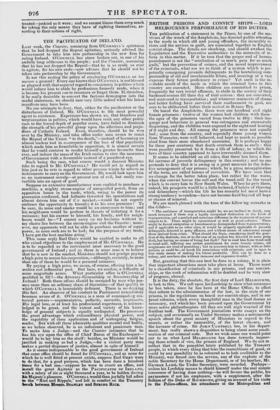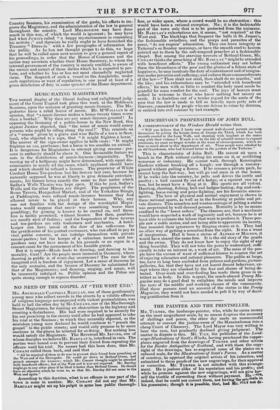BRITISH PRISONS AND CONVICT SHIPS — LORD MELBOURNE'S PERFORMANCE OF
'HIS DUTIES.
THE publication of a statement in the Times, by one of the sur- vivors of the wreck of the Amphitrite, has directed public attention to the mode in which old and young offenders, the incurably vi- cious and the novices in guilt, are associated together in English convict-ships. The details are shocking, and should awaken the Legislature and the Executive authorities to the necessity of re- form in this matter. If it be true that the proper end of human punishment is not the "retribution of so much pain for so much guilt," but the prevention of crimes, and the moral improvement of the criminals, what are we to think of a system which is per- petually consigning juvenile delinquents to the brutalizing corn- panionship of old and irreclaimable felons, and insuring at a vast expense their future proficiency in crime ? Yet such is the in- evitable result of the mode in which the criminal laws in this country are executed. Mere children are committed to prison, frequently for very trivial offences, to abide in the society of their hardened seniors till their day of trial arrives : they are convicted, and sentenced to transportation ; and whatever remnants of shame and better feeling have survived their confinement in gaol, are sure to be obliterated before their arrival in Botany Bay.
On board the Amphitrite, there were one hundred and eight female prisoners : twelve of the women had children with them • the ages of the prisoners varied from twelve to fifty : their lan- guage and behaviour in general was outrageous and excessively disgusting, and the children were exposed to the sight and hearing of it night and day. All among the prisoners were not equally bad ; some from the country, and especially three young women from Worcester, were well behaved, and kept as much as possible aloof from their more abandoned associates. It is perhaps happy for these poor creatures that death overtook them so early : they were possibly preserved by it from a life of infamy, to which the laws of their country appeared to have irrevocably doomed them.
It seems to be admitted on all sides, that there has been a fear- ful increase of juvenile delinquency in this country ; and no one pretends to deny that it is owing in a great measure to the defec- tive arrangement of our prisons; which, by a gross misapplication of the term, are Called houses of correction. bWe have seen that no change for the better takes place, but rather for the worse, when the convict leaves the cell and the tread-mill for the vessel which is to carry him to New South Wales. When he gets there, indeed, his prospects would be a little bettered, if habits of thieving and debauchery—which the life he has recently led must have a strong tendency to confirm—have not become fixed beyond all hope or chance of removal.
We are much pleased with the tone of the follow:ng remarks in the Globe- " The usefulness of transportation might be, we are inclined to think, very much increased if there was a legally recognized distinction in the kinds of
transportation, and a marked and notorious difference in the treatment of persons subject to it. There might be correctional as well as penal colonies. There might be forced emigration or banishment as distinguished from transportation; and if applicable to no other class, it would be properly applicable to juvenile delinquents detected in petty offences, and without means of subsistence except those derived from crime. NVhat should the State, considering itself the guar- dian of the destitute, aim at in the case of an orphan boy detected in some petty theft, but having no means of living but theft ? Not to send him from tread-mill
to tread-mill, inflicting one useless punishment fur some twenty crimes, till magistrates are tired Of punishing ; but to accustom him to labour, with as little severity as could be—to break Ins associations with criminals, and to open to him ready means of making his labour profitable. This can be done in a colony, and nowhere else without immense and expensive trouble."
But, granting that this can best be done in a colony, it is plain that important alterations must take place at home. There must be a classification of criminals in our prisons, and. our convict- ships, or the work of reformation will be doubled and be very slow of progress, abroad.
It is the duty, the absolute, the first duty of Lord MELBOURNE, to look to this. We call upon his Lordship to state what measures he has taken, since he' has been at the Home Office, to effect that reform in the administration of the law, in the state of our prisons, in the regulations on board our convict-ships, and in our penal colonies, which every thoughtful man in the land deems so necessary, and which has been pressed upon the Government by more active philanthropists till they are well nigh wearied of the fruitless task. The Government journalists write essays on the subject, and occasionally an Under Secretary makes a sentimental speech about the great anxiety of Ministers in regard to the morals, or rather the immorality, of the lower classes, and the increase of crime. Sir JOHN CAMPBELL too, in his depart- ment, has really shown a disposition to bring about some ameli- oration of our criminal code. But we wish some one would point out to us what Lord MELBOURNE has done towards improv- ing those schools of vice, the prisons of England. We do not re collect that in the pamphlet lately published by the Treasury people, in which every thing that bore the resemblance of good, or could by any possibility be so coloured as to look creditable to the Ministry, was forced into the service, any of the exploits of the noble Secretary for the Home Department, or of his brother, Mr. GEORGE LAMB, the Under Secretary, were recorded. Perhaps— unless his Lordship means to shield himself under the real simple innocence of having done nothing—he will favour the public, his paymasters if not his employers, with a supplement, after the fashion of the Duke of RICHMOND, giving an account of his visits to the Police-offices, his attendance -at the Metropolitan and Country Sessions, his examination of the gaols, his efforts to im- prove the Magistracy, and the administration of the law in general throughout the country. Lord MELBOURNE may have done much in this way, of which the world is ignorant ; he may have had what Jusrtus called "a happy mysteriousness in concealing his activity ;" and thereibre he really ought to have furnished the Treasury " fitters-in" with a few paragraphs of information for the public. As be has not thought proper t3 do this, we hope that he will be called upon next session to give a general report of his proceedings, in order that the House of Commons and the nation may ascertain whether their Home Secretary, to whom the internal government of the country is mainly confided, is aware of the nature and extent of those duties which he is expected to per- form, and whether he has or has not most shamefully neglected them. The despatch of such a vessel as the Amphitrite, under such regulations or want of regulation, is one proof at least of a gross dereliction of duty in some quarter of the Home department.





















 Previous page
Previous page